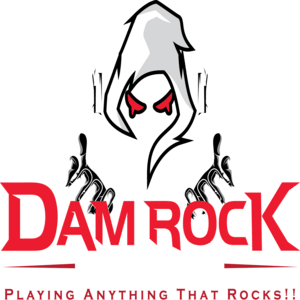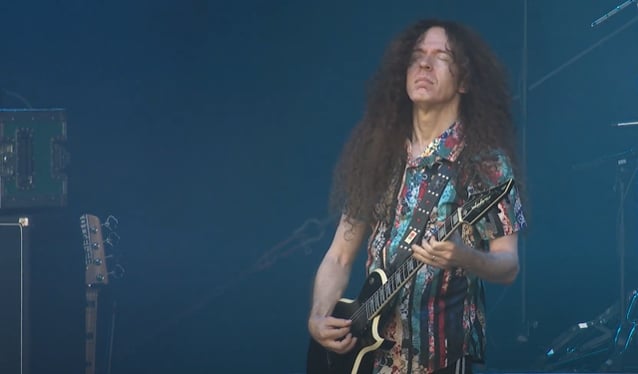In a new interview with Meltdown of Detroit’s WRIF radio station, former MEGADETH guitarist Marty Friedman once again spoke about why he finally decided to open up about his time with the band — after spending most of the last two decades focusing on his solo career — while writing his autobiography, “Dreaming Japanese”, which came out on December 3, 2024 via Permuted Press. He said (as transcribed by BLABBERMOUTH.NET): “I lost it big time [toward the end of my time with MEGADETH], and I never really talked about this because once I left MEGADETH, I stopped doing interviews about MEGADETH completely and I made it a clause in any contract having to do with a live appearance or anything, it’s, like, ‘You can’t mention MEGADETH in the marquee or in the advertisement or in the headline or anything.’ And I did this for 23 years. But in an autobiography, that’s a big part of my history, so now it’s time to talk about the things that really, really happened in detail and with honesty and with respect to that period of time and respect to the people in the band and the people around the band, talk about our managers and our crew and, of course, the members in the band and my relationships with them.”He continued: “It’s not gonna make me look good, I’m telling you this right now, when you read it [in my book]. I didn’t leave the band on the nicest terms and I kind of — I don’t wanna say ‘screwed the band over,’ but it wasn’t a really nice thing that I did. Of course, I had absolutely no choice to do what I did, and you’ll see why, but I feel really bad about the way I left the band and the situation I left them in, and you can see that in the book, why it turned out that way. And there’s no excusing what I did, but it wasn’t gonna happen any other way. Things happen and that’s what happened. So, now you’ll finally read it from the horse’s mouth, so to speak.”Marty added: “I think it’s interesting. It’s definitely not something I’m happy about. But, of course, I’m very glad I left the band and I was able to do things that far surpassed my time in the band, and the band has done wonderful things in my absence, so I think everybody wins. But at that period of time, it wasn’t nice for anybody, and I think that’s what makes for interesting reading. So, I think people will — at least they’ll get some closure on it; they’ll know the whys and the whos and all that.”Asked if the two gigs he played with MEGADETH in 2023 — first at the Budokan in Tokyo, Japan in February of that year and then at the Wacken Open Air festival in Wacken, Germany in August — gave him some personal closure regarding his time with the band, Marty responded: “Yeah. Especially the Budokan show in Japan, that was kind of the one thing that was hanging over… I left the band, it was over and all that, and we all went on to do our own things and have our own great successes, but when you’re in a band, especially MEGADETH at the level that we were at, there’s a bond in there that is in some ways deeper than family, and we all knew, especially myself and [MEGADETH leader] Dave Mustaine, we all knew that the desire to play MEGADETH together, to play Budokan together, that was just something…. It’s like one of those small kid-time dreams, you know what I mean? It was something that meant a lot to us at the time, and even though we went our separate ways, it was one of those unfinished-business type of things. And in the interim I had played Budokan several times in other projects in Japan and by myself and all kinds of different things but not with MEGADETH. And MEGADETH was the first time in my life and in Dave Mustaine’s life that we actually had our first shot at doing it, and it didn’t come to pass. And so the first time in the first six, seven times I played Budokan, it wasn’t with MEGADETH. So when we both had the chance to play together, it was a big celebration. Getting there is a big deal, and they got there without me. So I was proud of them for doing that, and I was honored to be asked to play there with them. It was a celebration of what I’d done, and also a big celebration of MEGADETH’s success without me. So I was their biggest supporter and glad to be there. And it was kind of a love letter to the fans and a celebration for us. So it was definite closure. That’s outlined a lot with a lot more personal details in the book, but it was a moment of closure, for sure.”Friedman previously discussed his reluctance to open up about his time with the band until he wrote about it in his autobiography during an appearance on the January 21 episode of SiriusXM’s “Trunk Nation With Eddie Trunk”. He said at the time: “It’s definitely true that even when I first started touring my solo music, which is quite some time ago, I made it an extreme important point within every contract that the word ‘MEGADETH’ or ‘ex-MEGADETH’ is not used anywhere, and otherwise the show is off and there’s a fine. And this I took very, very seriously and still do today. It’s in every single contract of everything that I do with my solo band.”It wasn’t difficult to write this MEGADETH stuff because I knew that I haven’t spoken about it in years, but I know everything that happened in my life with great clarity,” he explained. “I mean, as you see in the book, I stopped doing drugs when I was 17 — no drinking, no drugs — so everything is really clear in my mind, the things that happened. There’s no blurry periods of time in there; it’s all really clear. And so I think what kind of might have made it easier is the fact that I’d written everything after I had played Budokan with MEGADETH in 2023. I had, of course, a rough draft and manuscript of the entire book before that, but playing at Budokan with MEGADETH and meeting Dave [Mustaine] there and playing it together was a huge, huge load off both of our backs. And it was kind of a love letter to each other, a celebration of the history that we have together and a huge thank you to the fans who didn’t get to see that when it was originally booked and sold out. So it was kind of very therapeutic to do that show. And it was like taking a huge dump.”People put importance on certain things — it’s only one show, but, as you know, and a lot of people who know me know, Budokan is very, very big… It’s kind of a landmark in my life as a music fan and as a music player, and every time that I play there, before playing with MEGADETH and since, it’s just a big deal, because it’s one of those little-kid things, like, ‘I wanna play at Budokan. It’s my dream.’ And so when those things happen, it’s big, even bigger than other things that should be bigger. But anyway, having that behind us, I was able to really be straight and not pull any punches,. I uncovered everything, all the stuff that I did that wasn’t so cool, and all the stuff that everyone else did that wasn’t so cool. And I also said all the cool things that everyone did, which, thankfully, far outweigh any uncool stuff. I mean, you don’t wanna stay in a band for 10 years if things aren’t cool.”Friedman added: “I’ll just go on record and say [being in MEGADETH] was a wonderful, wonderful experience, but within any experience, like MEGADETH especially, you’re in a bubble and you see the bandmembers in a more intimate way than you do even your own family. You’re not with your family 24 hours a day, 11 months out of the year in bathrooms and dressing rooms and hotels and gigs and everywhere, so it’s a really deep relationship, so things are gonna happen, there’s gonna be drama. And so it was kind of fun to think what fans are going to find interesting and put that in the book. And there’s a lot of petty nonsense in there as well. And I found that quite entertaining to write, because it’s not the most important things but I think it humanizes everybody — petty, little things that we would bicker about and things that blew up into big arguments and things that didn’t, things that went well things that didn’t go well. It’s flat. There’s no agenda, there’s no leaning left or right on it — it’s just exactly how I saw it. And I think it’s a very big, long, fun part of the book and will answer a lot of questions for the fans of MEGADETH and myself in that band, because I’ve always been very — not necessarily guarded, but not very sparing. [There’s] not a lot of private information on me out there, so it was kind of fun to think of the things that definitely nobody knows and probably the band guys all remember for sure, but not things that have been in interviews and stuff like that.”Friedman also talked about the debilitating panic attacks he was experiencing while he and the rest of MEGADETH were touring in support of their 1999 album “Risk”, his final recorded appearance with the band.”Yeah, [the panic attacks] set me off for a whole year,” Marty said. “And it was after I had announced that I quit the band to the band. It wasn’t announced in public or anything, but it was announced to the band, so I was gonna finish out the tour we were on and then, once the tour was gonna take a break, I was gonna leave and they were gonna find another guy. But all the gory details are in there, but to sum it up, I had this — I didn’t know it was a panic attack at the time, but it was a monster.”I’d never had any issues with any kind of mental issues or psychological issues or health issues at all,” Marty revealed. “Suddenly I was in the ER and I was just freaking out completely. I couldn’t move. I was screaming. I was shouting. It’s out of nowhere, dude. It was just out of nowhere. I had no idea what it was. And I had to figure out a way to continue the tour in that condition. And I couldn’t walk without two people carrying me around. I’m cutting out a lot of the details here because it’s impossible to shorten it. But I was on so many anti-depression things and muscle relaxers and all kinds of different drugs just to keep me from going completely mad. And then I found that if I ate these grilled chicken sandwiches, that sort of helped. And the only thing other than help was staying in a hot bathtub for hours on end. So what I would do — it was such a horrible thing. And I cringe when I think about it because I put the staff, the band and everyone around me in such a horrible situation, but I wasn’t going to do anything without being in a fricking bathtub all day and being shuttled around like a fricking diva. And people would take me to eat, and I would go off on the waiters and stuff. And it’s so unlike me. I was a completely different person. I put this in the book. I remember I was at a Japanese restaurant. And [Carlos] Santana’s music was playing in the background. And I started screaming. It was like a sushi restaurant. I’m, like, ‘Okay, there’s probably protein here. Good. I can eat this.’ As soon as I heard some of Santana’s music in the background, I’m, like, ‘What the fuck is this? This is a Japanese restaurant. Why are they playing Mexican music in here? What the fuck is this?’ And I was screaming this at the top of my lungs, banging down on the table. Wasabi and ginger was flying all over the place. I was just such a horrible human being to everyone around me. And it was just so out of character, but in that moment, that’s what it was, dude. I mean, it was that.”And what really sucked about this was if I did stay in the bathtub all day and eat nothing but protein things and chicken sandwiches, the second I got on stage, I was normal,” Friedman added. “I could fucking play — I could play music, and then when I got off the stage, I was over the wreck again; I was a complete wreck. So the guys in the band and the people in the staff were, like, ‘What the fuck’s wrong with this guy? He’s totally fine. He’s acting like he’s sick and shit.’ And so they probably hated my guts and rightfully so.”You don’t wanna talk about this stuff, but it’s your autobiography,” Marty explained. “But that’s what it was, dude. It was that. I didn’t wanna cause people problems, but I was there, that was happening, and I was not a good person for the entire time. And it took me, like, eight months after the tour stopped and I got off the tour completely of completely vegging out in my house. I didn’t play guitar. I didn’t listen to music. All I did was, like, take these antidepressant things and sit in the bathtub and eat fucking chicken sandwiches. That’s what I did for, like, eight months until I started to see a little improvement and become normal again.”This is the first time I ever talked about that, that awful, awful stuff in the book. And I talked about the psychological reasons for that in there, which is too detailed to talk about now, but they figured out kind of what it was and I kind of made peace with it. And I got back to myself around 2001, but that whole year was just — I feel sorry for everyone around me and I don’t blame anyone at all for not forgiving me. I was not a cool person and, yeah, I’m just glad I came out of it.”I thought that I was gonna turn into one of those — you know the lyrics in the RAMONES song [‘Teenage Lobotomy’] where they’re talking about ‘DDT’, ‘lobotomy’ and all that stuff, and I thought I was gonna be one of those people in the rubber rooms. That’s what I saw in my future. That’s what I felt like. And I’m just so grateful that I came out of it, but it took a real, real long time. Real long. Crazy stuff.”Marty’s latest solo album, “Drama”, came out last May via Frontiers Music Srl.Friedman’s first major impact in music was in the game-changing guitar duo CACOPHONY, which he founded with equally enigmatic and now-legendary guitarist Jason Becker. He then spent 10 years as lead guitarist in the genre-defining thrash metal act MEGADETH before moving to Tokyo due to his love for Japanese music, language, and culture.Following his move, he landed a starring role for a new TV comedy “Hebimeta-san” (“Mr. Heavy Metal”) and its spinoff, “Rock Fujiyama”, which ran for six seasons and propelled him into the living rooms of Japan’s mainstream. He has since appeared in over 800 TV shows, movies and commercials, including a two-year campaign with Coca-Cola for Fanta, authored two best-selling novels and was the first-ever foreigner to be appointed as an ambassador of Japan heritage and perform at the opening ceremony for the Tokyo Marathon.At the same time, Marty has continued his career in music with several solo albums in addition to writing and performing with the top artists in Japanese music, racking up countless chart hits, including a No. 1 with SMAP, two No. 2 songs with MOMOIRO CLOVER, a No. 2 with SOUND HORIZON — just to name a few.[embedded content]







